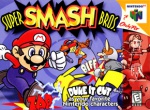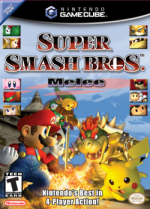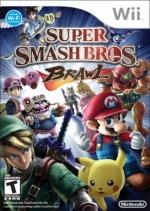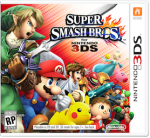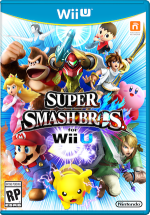Super Smash Bros. (series): Difference between revisions
Torchickens (talk | contribs) mNo edit summary |
Torchickens (talk | contribs) No edit summary |
||
| Line 52: | Line 52: | ||
|[[Terminology#W|Wii U]] | |[[Terminology#W|Wii U]] | ||
|{{releasedateB|Japan|Winter 2014|USA|Holiday 2014|Europe|Holiday 2014}} | |{{releasedateB|Japan|Winter 2014|USA|Holiday 2014|Europe|Holiday 2014}} | ||
|Starfy re-appears in | |Starfy re-appears in [[E3#E3 2014|E3 2014]] demos of ''Super Smash Bros. for Wii U'' as an [[smashwiki:Assist Trophy|Assist Trophy]] with the same behavior as in ''Super Smash Bros. Brawl'', but the melody when he appears that plays in ''Super Smash Bros. Brawl'' based on the beginning of [[Confrontation with the Boss (music)|Confrontation with the Boss]] apparently does not play. | ||
|} | |} | ||
|} | |} | ||
Revision as of 17:35, 13 June 2014
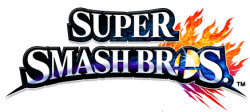
The Super Smash Bros. (Japanese: 大乱闘スマッシュブラザーズ) series, sometimes abbreviated as Sumabura (Japanese: スマブラ) in Japan, is a series of fighting games published by Nintendo. It features mainly Nintendo characters (with a few third party characters as of the third and fourth entries in the series) and the main objective of the game is to deal damage (measured in %) and knock characters off the screen. The higher % value a character has, the easier it is to knock them off the screen.
The original idea for the game originated from a prototype called "Dragon King: The Fighting Game" (Japanese: 格闘ゲーム竜王), which Satoru Iwata and Masahiro Sakurai worked on together. Masahiro Sakurai handled the planning, specs, design, modeling and movement and Satoru Iwata handled the programming. [1][2] When this game was in development, there were originally no Nintendo characters until Nintendo approved to Masahiro Sakurai's idea of adding them.
Games
|
